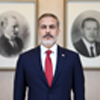From the Minister
Hakan FİDAN

Hakan Fidan is appointed as the Minister of Foreign Affairs in the new cabinet formed after the second round of the presidential elections held on May 28, 2023. He was born in Hamamönü, Ankara in 1968.
Having graduated from the Turkish Military Academy and the Land Forces Language School, Fidan pursued a significant part of his academic studies during his service in the Turkish Armed Forces. While on a NATO mission abroad, he obtained bachelor's degree in Politics and Administrative Science from the University of Maryland University College. He then obtained his master's and doctoral degrees from the Department of International Relations at the Bilkent University.
Following his service in the Turkish Armed Forces, Fidan focused on academic life and gave lectures in the field of International Relations at Hacettepe University and Bilkent University.
He held critical positions in the state administration in foreign policy and security domains. He served as the President of the Turkish Cooperation and Coordination Agency, Deputy Undersecretary responsible for foreign policy and security issues at the Prime Ministry, Board Member of the International Atomic Energy Agency, Special Representative of the Prime Minister, Deputy Undersecretary of the National Intelligence Organization, Undersecretary/Director of the National Intelligence Organization, and Special Representative of the President.
Fidan was appointed as the Undersecretary/Director of the National Intelligence Organization on May 27, 2010, and served in that position for 13 years.
Fidan is married and has three children.
Hakan FİDAN
Minister of Foreign Affairs